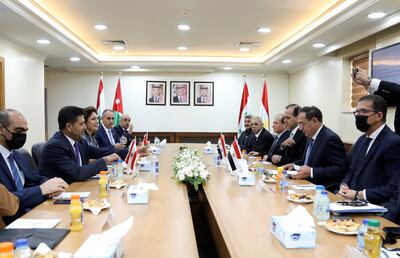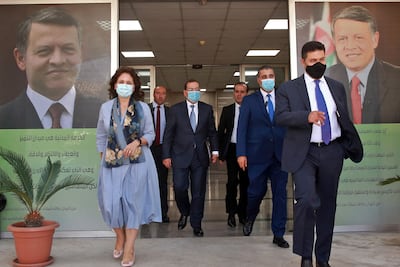The energy ministers of four Arab countries agreed on Wednesday on a “road map” to help solve the electricity crisis in Lebanon.
The ministers from Jordan, Lebanon, Egypt and Syria discussed during a meeting in Amman, a US-endorsed project to transport Egyptian gas through Syrian territory to fuel electricity generation in Lebanon.
They did not give a timeline for the project.
The decades-old power shortages in Lebanon became in the last few weeks part of the political competition between the US and Iran in the Middle East.

Egyptian Minister of Petroleum and Mineral Resources Tarek El Molla described the meeting as "preliminary".
He said the four countries needed to agree on "the readiness of the infrastructure" to pump the gas.
"We have to check on the network and its auxiliaries. Contractual points should be also reviewed," he told reporters after the meeting at the Energy Ministry in Amman.
"We put a road map and after doing the reviews we hope that pumping occurs at the earliest opportunity," he said.
His remarks appeared more cautious than that of Jordanian Energy Minister Hala Zawati, who said the pipeline is "almost ready" to transport the gas.
If realised, the project would be the first major integration of the Syrian regime in a regional effort, after the Arab league and international community isolated it in 2011 for its crackdown on revolt against five decades of Assad family rule.
It would also require exemptions from US sanctions on the regime in Damascus. Washington has said it does not oppose the project.
US officials also indicated that the project would be more preferable to them than Iranian moves to supply Lebanon with fuel for electricity.
With US encouragement, Jordan and Egypt said last month that they were willing to supply Lebanon with gas and electricity.
The Syrian government swiftly agreed to playing a role in the project.
While the meeting in Amman was also expected to discuss supplying Lebanon with electricity from the Jordanian grid, official Jordanian television said the proposal has been postponed.

Ms Zawati said the issue will be discussed in the next few weeks.
The Jordanian and Egyptian offers came after Hezbollah said last month that Iran would supply Lebanon with fuel for electricity generation.
Two vessels with Iranian gas oil are reportedly in the Red Sea on their way to Lebanon, in possible contravention of US sanctions against Iran.
Lebanese Energy Minister Raymond Ghajar said his country hoped to receive enough Egyptian gas to power a 450 megawatt station at Deir Ammar on the Mediterranean.
This represents about 15 per cent of Lebanon’s generation capacity.
State electricity in the country has been virtually non-existent for most of this year, with Lebanon’s economic crisis deepening.
Deir Ammar is the only main power station in Lebanon connected to the Arab Gas Pipeline, which links Egypt to Syria through Lebanon and Jordan.
Syrian Oil Minister Bassam Tohme said the gas network in Syria was "operational".
But a Syrian contractor working on government projects told The National that it would take at least a year to repair sections of the Arab Gas Pipeline running through areas under control of the regime.

